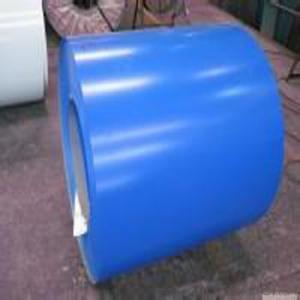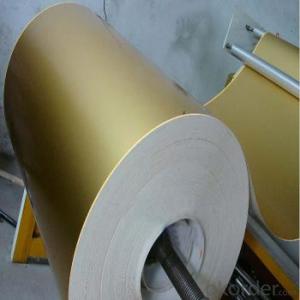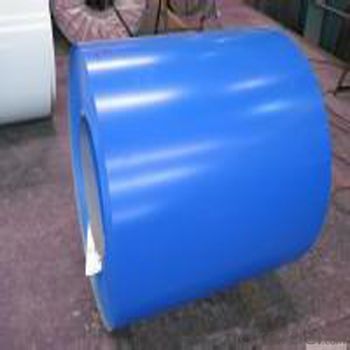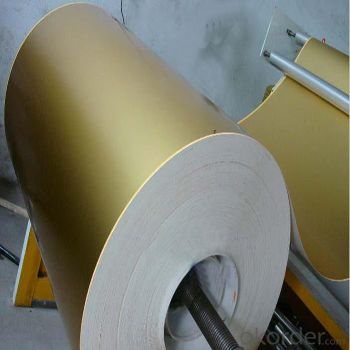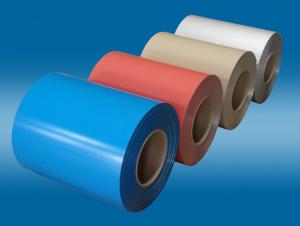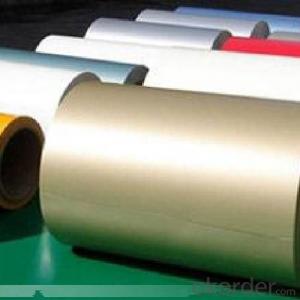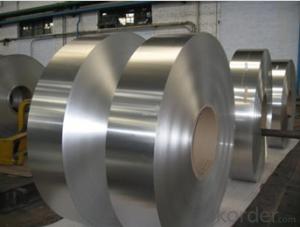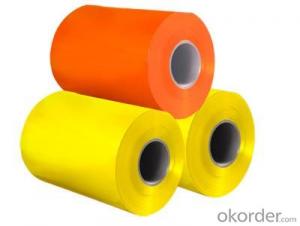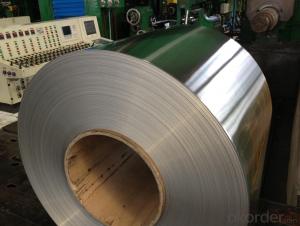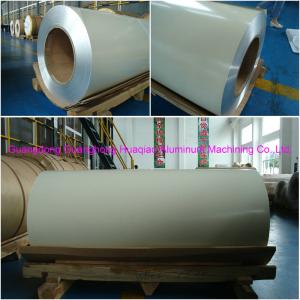Wholesale Painted Aluminum Coil - Prepainted Coils, Sheets, and Strap
- Loading Port:
- Shanghai
- Payment Terms:
- TT OR LC
- Min Order Qty:
- 100 m.t.
- Supply Capability:
- 100000 m.t./month
OKorder Service Pledge
OKorder Financial Service
You Might Also Like
Description
ALUMINIUM COIL
ALLOY: AA1***
AA3***
AA5***
TEMPER: H14 H16 H18 H22 H24 H26 H32 O/F
THICKNESS:0.03MM-3.0MM
WIDTH: 30MM-1700MM
COATING: PE(POLYESTER),PVDF,EPOXY
STANDARD: GB/T 17748-1999
2.Application
This product is used for ACP, Ceiling panel, insulation panel, sandwish panel, rolling shutter and so on.
3. Why you can choose us?
We can promise best quality and price!
4.Pictures
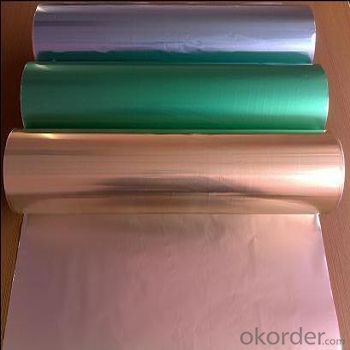
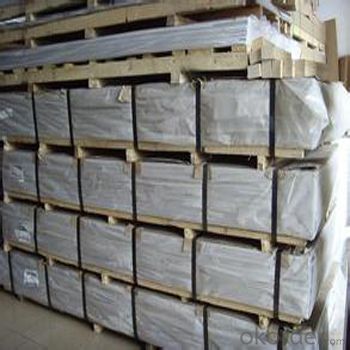
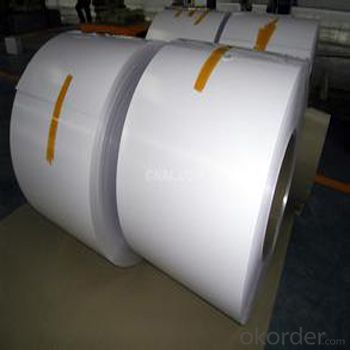
5.FAQ
1)what is aluminum?
Aluminium (or aluminum; see spelling differences) is a chemical element in the boron group with symbol Al and atomic number 13. It is a silvery white, soft, nonmagnetic, ductile metal. Aluminium is the third most abundant element (after oxygen and silicon), and the most abundant metal in the Earth's crust. It makes up about 8% by weight of the Earth's solid surface.
Aluminium metal is so chemically reactive that native specimens are rare and limited to extreme reducing environments. Instead, it is found combined in over 270 different minerals.The chief ore of aluminium is bauxite.
2)What's kind of payment term we can supply?
CIF,CFR, FOB and other.
3)Can we supply samples?
Yes, we can!
4)What can you do if you have other quastions?
You can contact us freely at any time!
- Q: What are the different alloy grades used in aluminum coils?
- There are several different alloy grades commonly used in aluminum coils, including 3003, 5052, 6061, and 7075. These grades have varying levels of strength, corrosion resistance, and weldability, making them suitable for different applications in industries such as automotive, construction, and aerospace.
- Q: What are the different types of end conditions for aluminum coils?
- There are several different types of end conditions for aluminum coils, which refer to how the ends of the coil are finished or prepared for different applications. Some common end conditions for aluminum coils include: 1. Mill Finish: This is the most basic and common end condition for aluminum coils. In mill finish, the ends of the coil are left as they come off the rolling mill, without any additional processing or finishing. This end condition is suitable for applications where the appearance of the ends is not critical. 2. Trimmed or Sheared: In this end condition, the ends of the coil are trimmed or sheared to remove any uneven or rough edges. This results in clean and smooth ends, which are often required for certain applications where a precise fit or appearance is important. 3. Slit: When an aluminum coil is slit, it means that it is cut into narrower strips or coils. Slitting is often done to customize the width of the coil according to specific requirements. The ends of slit coils can be either mill finish or trimmed, depending on the desired application. 4. Recoiled: Recoiling is the process of rewinding a coil into a smaller or larger coil diameter. This end condition is commonly used when smaller coils are needed for storage, transportation, or further processing. Recoiling can be done with or without additional trimming or shearing of the ends. 5. Flattened: Flattening is a process where the coil is unrolled and flattened to create a sheet or plate. This end condition is often used when the aluminum is intended for further fabrication, such as stamping, forming, or cutting into specific shapes or sizes. The ends of flattened coils are typically trimmed to ensure a clean edge. It is important to note that the specific end condition required for aluminum coils may vary depending on the intended application and customer specifications. Different industries and uses may have unique end condition requirements to ensure optimal performance and appearance of the aluminum coils.
- Q: What are the common surface protection methods for aluminum coils?
- The common surface protection methods for aluminum coils include anodizing, painting, and coating with protective films or laminates.
- Q: What is the density of aluminum coils?
- The density of aluminum coils can vary depending on their size, shape, and composition. However, the average density of aluminum is around 2.7 grams per cubic centimeter (g/cm³). This means that for every cubic centimeter of aluminum coil, it weighs approximately 2.7 grams. It's important to note that the density can differ slightly based on factors such as impurities or alloying elements, but the average value provides a good estimate for the density of aluminum coils.
- Q: What is the structure of Aluminium Chloride at 180, 192.4 (melting point) and 200 degrees celsius? When does it exist as an ionic lattice and when as a Al2Cl6 dimer?
- Aluminium chloride sublimes (turns straight from a solid to a gas) at about 180°C. If it simply contained ions it would have a very high melting and boiling point because of the strong attractions between the positive and negative ions. The implication is that it when it sublimes at this relatively low temperature, it must be covalent. The dots-and-crosses diagram shows only the outer electrons. Hope that help Check here for more information; www.chemguide .uk/atoms/bonding...
- Q: What are the potential health hazards associated with the use of aluminum coils?
- <p>There are concerns about the health risks associated with using aluminum coils, particularly in cooking. Aluminum can leach into food when heated, and excessive intake may lead to cognitive impairment and neurological issues. However, the risk is generally considered low with normal usage. It's important to follow proper cooking practices and use utensils that are not reactive with aluminum to minimize exposure. For those with concerns, alternatives like stainless steel or cast iron can be used to reduce potential health risks.</p>
- Q: Can aluminum coils be customized to specific thicknesses and widths?
- Yes, aluminum coils can be customized to specific thicknesses and widths.
- Q: How do aluminum coils impact energy efficiency?
- Aluminum coils play a crucial role in enhancing energy efficiency in various applications. They are commonly used in heating, ventilation, and air conditioning (HVAC) systems, refrigerators, and heat pumps. The primary reason for their positive impact on energy efficiency is their excellent heat transfer properties. Aluminum is an excellent conductor of heat, which means it can quickly absorb and dissipate thermal energy. When used in HVAC systems, aluminum coils facilitate the transfer of heat between the indoor and outdoor units. This efficient heat transfer reduces the workload on the system, allowing it to operate more efficiently and consume less energy. Additionally, aluminum coils are lightweight and have a high surface area, which further enhances their heat transfer capabilities. Their lightweight nature reduces the overall weight of the system, resulting in lower energy consumption. The increased surface area allows for greater contact between the air and the coils, promoting more effective heat exchange. Furthermore, aluminum coils are resistant to corrosion, which is a common issue in HVAC systems. Corrosion can negatively impact the efficiency of heat transfer, leading to increased energy consumption. Aluminum coils' resistance to corrosion ensures long-lasting performance, maintaining their efficiency and reducing the need for frequent maintenance or replacement. In summary, aluminum coils contribute significantly to energy efficiency by facilitating efficient heat transfer, reducing the workload on HVAC systems, and minimizing energy consumption. Their lightweight nature, high surface area, and corrosion resistance further enhance their positive impact on energy efficiency.
- Q: How much can i get for a gallon filled with aluminum Tabs from cans
- Aluminum is not sold by the gallon, it is sold by the pound, so you need to weigh what you have to determine what it is worth. Aluminum is not expensive, so the price you can expect is around 30 to 60 cents per pound.. Contact local recycling centers near you to find out what the going rate for is in your area.
- Q: How are aluminum coils used in the production of marine vessels?
- Aluminum coils are extensively used in the production of marine vessels due to their unique properties and advantages. Firstly, aluminum is a lightweight material compared to other metals commonly used in shipbuilding such as steel. This characteristic makes it ideal for constructing marine vessels as it reduces the overall weight of the ship, allowing it to float more easily in water. The use of aluminum coils in the construction process ensures that the vessel remains buoyant without compromising its structural integrity. Secondly, aluminum is highly corrosion-resistant, especially when exposed to saltwater environments. Marine vessels are constantly exposed to water, which can be corrosive and damaging to metal components. By using aluminum coils, shipbuilders can minimize the risk of corrosion and increase the longevity of the vessel. Moreover, aluminum coils offer excellent thermal conductivity. This property is crucial in marine vessels as it helps dissipate heat generated by engines, machinery, and equipment, ensuring that the ship operates efficiently and safely. Additionally, aluminum coils can be easily formed, shaped, and welded, making them highly malleable and adaptable for various shipbuilding requirements. This flexibility allows shipbuilders to create complex and streamlined designs, optimizing the vessel's performance and fuel efficiency. Furthermore, aluminum coils are environmentally friendly as they are 100% recyclable, reducing the carbon footprint associated with marine vessel production. This aspect aligns with the growing demand for sustainable and eco-friendly shipbuilding practices. In conclusion, aluminum coils play a vital role in the production of marine vessels. Their lightweight nature, corrosion resistance, thermal conductivity, malleability, and recyclability make them an ideal choice for shipbuilders. By utilizing aluminum coils, marine vessels can be constructed to be more efficient, durable, and environmentally friendly.
Send your message to us
Wholesale Painted Aluminum Coil - Prepainted Coils, Sheets, and Strap
- Loading Port:
- Shanghai
- Payment Terms:
- TT OR LC
- Min Order Qty:
- 100 m.t.
- Supply Capability:
- 100000 m.t./month
OKorder Service Pledge
OKorder Financial Service
Similar products
Hot products
Hot Searches
Related keywords
